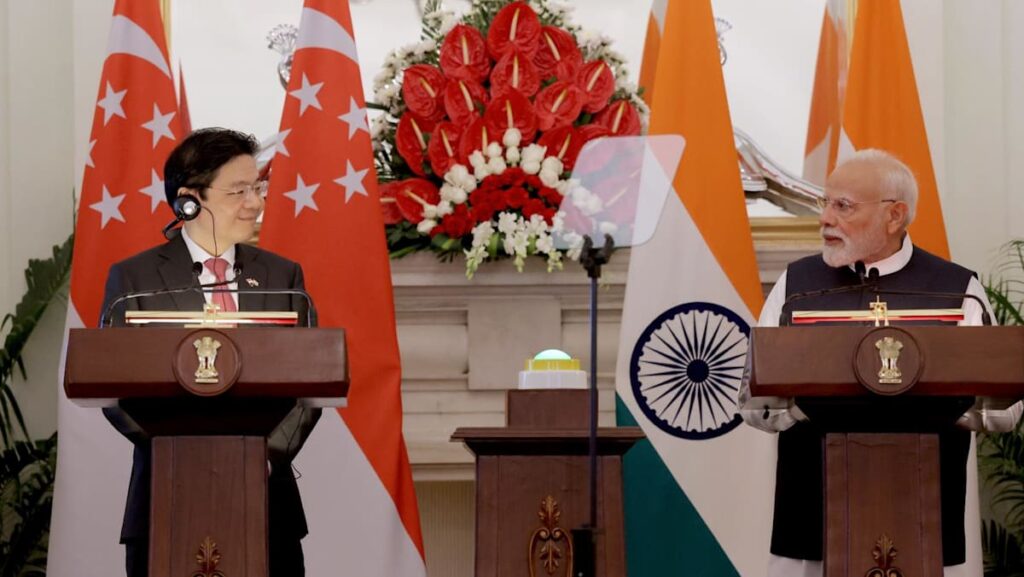NEW DELHI: India and Singapore have signed five memorandums of understanding (MOUs) in areas spanning aviation, cleaner shipping, skills development, digital banking and the space industry.
The exchange of MOUs was witnessed by Singapore’s Prime Minister Lawrence Wong and India’s Prime Minister Narendra Modi in New Delhi on Thursday (Sep 4).
This accompanied the announcement of a new roadmap charting the way forward for the Comprehensive Strategic Partnership between both countries.
India and Singapore mark 60 years of diplomatic relations this year, and Mr Wong is in New Delhi for his first visit to India as head of government.
SKILLS, SPACE AND DIGITALISATION
An MOU on skills development will set up a national centre of excellence for advanced manufacturing – including semiconductors, automation and robotics – in Chennai, Tamil Nadu.
There, India and Singapore will jointly develop an industry-oriented curriculum, train faculty and work on India’s skills certification framework, with Singapore sharing expertise in quality assurance and certifying vocational qualifications.
The five-year collaboration was agreed between Singapore’s Ministry of Trade and Industry and India’s Ministry of Skills Development and Entrepreneurship.
This follows an earlier agreement for both countries to work together on skills development to support India’s manufacturing growth and increasing demand for skilled labour in semiconductors, electronics and aviation maintenance, repair and overhaul (MRO).
Speaking to the press, Mr Wong said Singapore was honoured to accept India’s invitation to be its global partner for this project. He said Singapore will also work with India to set up state-level skill centres to meet industry needs.
Another frontier for deeper cooperation is space. An MOU between the national space offices of India and Singapore encourages more partnerships among research and industry players, as well as in space policy and law.
More than 20 Singapore-made satellites have been lifted into orbit by India’s launch vehicles and in recent years, there has been more momentum for commercialisation of the industry in both countries.
Another MOU between the Monetary Authority of Singapore and Reserve Bank of India will see the central banks develop new and more efficient digital financial channels to support cross-border financial and real economy flows.
The key aims are to promote technological and financial innovation across both economies, including exploring the use of digital asset transactions for such flows.
Existing link-ups in this area include the real-time payments system linkage between Singapore’s PayNow and India’s Unified Payments Interface launched in 2023.
AVIATION AND SHIPPING
India and Singapore have mutual interests in aviation and maritime supply chain connectivity.
There are currently 246 weekly flights between Singapore and India.
Singapore Airlines has a 25.1 per cent stake in Air India, and SIA Engineering is planning to build up aviation maintenance, repair and overhaul facilities in India to support Air India’s growing fleet.
A new MOU on civil aviation training and research and development will help to support the growth of India and Singapore’s aviation sectors.
The Civil Aviation Authority of Singapore and Airports Authority of India will share knowledge in aviation safety and security, airport operations and air traffic management.
They will come up with training programmes together to build skills in both countries’ aviation workforces, and conduct research and innovation to develop new solutions and capabilities in these areas.
“This will support the growth of our aviation sectors, facilitate trade and tourism and create more commercial opportunities,” said Mr Wong.
Another new MOU between the governments of India and Singapore will support digitalisation and decarbonisation efforts of the maritime sector.
Both countries will work with industry partners to enable uptake of cleaner marine fuels, promote digital and smart solutions for maritime operations, and promote joint R&D on emerging green technologies and solutions.
LARGEST CONTAINER TERMINAL IN INDIA
Also on the maritime front, port operator PSA has been in India for more than 25 years and runs four terminals.
On Thursday, Mr Wong and Mr Modi virtually inaugurated Phase Two of PSA Mumbai, known as the Bharat Mumbai Container Terminal.
Mr Wong noted that with this extension, PSA Mumbai will become India’s largest standalone container terminal. It is located in India’s largest container port, Jawaharlal Nehru Port in Navi Mumbai, Maharashtra.
When fully operational, PSA Mumbai will have a total handling capacity of 4.8 million twenty-foot equivalent unit (TEU) containers, or more than half the capacity of Jawaharlal Nehru Port.
Read the full article here
